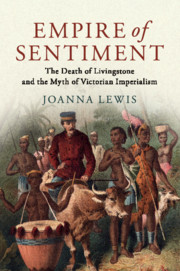Book contents
- Frontmatter
- Dedication
- Contents
- List of Figures
- List of Maps
- Acknowledgements
- Prologue: The Pathetic Death of Bwana Ingeleshi
- Introduction
- 1 ‘A Parliament of Philanthropy’: The Fight to Bury Livingstone
- 2 Laying to Rest a Victorian Myth: The ‘Lost Heart of the Nation’, Victorian Sentimentality & the Rebirth of Moral Imperialism
- 3 A Perfect Savagery: The Livingstone Martyrs & the Tree of Death on Africa's ‘Highway to Hell’
- 4 The Graveyard of Ambition: Missionary Wars, Bachelor Colonialism & White Memorials, Chitambo, 1900– 1913
- 5 White Settlers, Frontier Chic & Colonial Racism: How Livingstone's Three Cs Fell Apart
- 6 ‘The Hearts of Good Men’: 1973, the One- Party State & the Struggle against Apartheid
- 7 ‘Chains of Remembrance’: Livingstone, Sentimental Imperialism & Britain's Africa Conversation, 1913– 2013
- Conclusion
- Epilogue: The Testimony of Pastor Manduli
- Index
6 - ‘The Hearts of Good Men’: 1973, the One- Party State & the Struggle against Apartheid
Published online by Cambridge University Press: 06 January 2018
- Frontmatter
- Dedication
- Contents
- List of Figures
- List of Maps
- Acknowledgements
- Prologue: The Pathetic Death of Bwana Ingeleshi
- Introduction
- 1 ‘A Parliament of Philanthropy’: The Fight to Bury Livingstone
- 2 Laying to Rest a Victorian Myth: The ‘Lost Heart of the Nation’, Victorian Sentimentality & the Rebirth of Moral Imperialism
- 3 A Perfect Savagery: The Livingstone Martyrs & the Tree of Death on Africa's ‘Highway to Hell’
- 4 The Graveyard of Ambition: Missionary Wars, Bachelor Colonialism & White Memorials, Chitambo, 1900– 1913
- 5 White Settlers, Frontier Chic & Colonial Racism: How Livingstone's Three Cs Fell Apart
- 6 ‘The Hearts of Good Men’: 1973, the One- Party State & the Struggle against Apartheid
- 7 ‘Chains of Remembrance’: Livingstone, Sentimental Imperialism & Britain's Africa Conversation, 1913– 2013
- Conclusion
- Epilogue: The Testimony of Pastor Manduli
- Index
Summary
We were told about him by my great-uncle Shingoma, who met him in person twice near Mazabuka. He was a tall, strong man. He had a British wife called Mary, and we were told by my grandfather that she was the daughter of another British man in Africa, who was less popular than Livingstone. The villagers in Shingoma's area would congregate to welcome the white man. He would arrive with his African companions and would at times partake of the African hosts’ food and drink. According to Shingoma, Dr Livingstone would use sign language to communicate with people. He would point to heaven to indicate ‘God’. He would encourage people to love each other by shaking their hands with a smile. One of his most difficult tasks was to teach the villages about the hydro or rain cycle. He would point at a body of water, make gestures of steam rising, then point to the clouds, then gesture rain. The villages would await his arrival with eagerness. He twice promised to return after he had witnessed the Falls, and twice did so. The third time, it didn't work. The great man had died of malaria.
Reminiscences of retired Tonga UNIP intelligence officer, Southern Province, 2005This chapter looks at how the Livingstone legend lived on after the end of colonial rule in this part of Africa. It offers a case study in the continuity of imperial and post-imperial regimes through an exploration of the usefulness of the memory of Livingstone to a newly independent Zambia. In 1973, Livingstone was feted and worshipped with the same emotion and sentimentality as he had been in 1874, with the same discourse of the heart. Symbolic of the continuity between the moral rhetoric and political practice of the colonial and postcolonial state, the place chosen to revive and display a Christian liberal moral community was the Chitambo graveside, unchanged since 1902. Bizarrely, Livingstone, the gatekeeper of colonialism, received the greatest national ceremony in life or death from an independent African government. British officials seem to have been excluded from all events.
- Type
- Chapter
- Information
- Empire of SentimentThe Death of Livingstone and the Myth of Victorian Imperialism, pp. 191 - 211Publisher: Cambridge University PressPrint publication year: 2018



